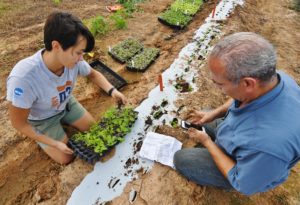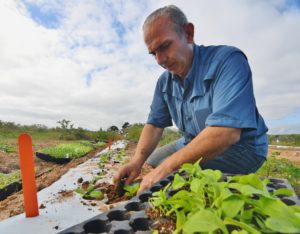Asian vegetable trial to determine market, production viability in Texas
- Writer: Adam Russell, 903-834-6191, [email protected]
- Contact: Dr. Genhua Niu, 915-859-9111, [email protected]
OVERTON – Texas A&M AgriLife Research and the Texas A&M AgriLife Extension Service have teamed up for a year-long trial to test the feasibility and profitability of growing Asian vegetables in Texas.

Trials will be held at AgriLife facilities in El Paso, Overton, Uvalde and Weslaco.
The study will include Drs. Genhua Niu, AgriLife Research horticulturist, El Paso; John Jifon, AgriLife Extension plant physiologist, Weslaco; Daniel Leskovar, AgriLife Research vegetable physiologist, Uvalde; Gregory Torell, AgriLife Research environmental and natural resources economist, El Paso; and Joe Masabni, AgriLife Extension horticulturist, Overton.
The total budget for the trial and economic assessment for cool- and warm-season vegetables is about $50,000, Niu said. The scientists will assess the vegetables in unimproved soil, in high tunnels and in greenhouses during the trials, They will include fall and spring plantings to test cool-season varieties such as bok choi, tatsoi and Chinese celery, as well as warm-season varieties to include Asian eggplant, yardlong beans and smooth luffa.
“We’re doing the research because demand for Asian vegetables is increasing due to changing demographics and consumer awareness,” Niu said. “Asian vegetables are proven to be profitable crops in other states, but farmers in Texas aren’t familiar with how to grow them and whether they can be profitable. So, we want to look at market demand around the state and field test a range of Asian vegetables in four locations to see if they are a fit for Texas producers.”

Niu said Texas has the third-highest Asian population in the U.S. and Asian vegetables are one of the most profitable crops for producers on the East Coast based on market prices.
“The production costs for Texas farmers is unknown, and a great deal of the study will be focused on determining the economics of these crops as it relates to prices, demand and how producers can access those markets and be profitable,” she said. “So, we are looking at market opportunity and potential consumers as well as crop performance.”
Niu said the scientists are looking for external funding to expand the field trials into the future.
“We have such a wide range in climates that planting dates, growing environments and availability of resources will be different,” she said. “This first year will be limited, but we hope to expand the research by finding external grants. This initial trial, especially determining the Texas market for these vegetables, will help us understand the potential for growers.”


